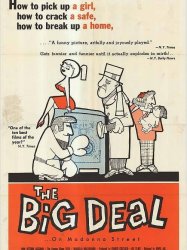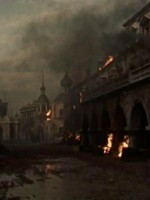Mario Monicelli is a Actor, Director, Scriptwriter, Executive Producer and Assistant Director Italien born on 16 may 1915 at Rome (Italie)

Mario Monicelli ([ˈmarjo moniˈtʃɛlli]; 16 May 1915 – 29 November 2010) was a twice-Oscar nominated Italian director and screenwriter and one of the masters of the Commedia all'Italiana (Comedy Italian style).
He attended studies in the local lyceum, and entered into the film world through his friendship with Giacomo Forzano, son of the playwright Giovacchino Forzano, who had been encharged by Benito Mussolini with the founding of cinema studios in Tirrenia. Monicelli lived a carefree youth, and many of the cinematic jokes he later shot in Amici Miei were taken from his experience.
Monicelli made his first short in 1934, a collaboration with his friend Alberto Mondadori. He followed this work up with the silent film I ragazzi della Via Paal (an adaptation of the novel The Paul Street Boys), which was an award-winner in the Venice Film Festival. His first feature length work was made in 1937 (Pioggia d'estate, "Summer Rain"). In the years 1939–1942 Monicelli also produced numerous screenplays (up to 40), and worked as an assistant director.
Monicelli made his official debut as a director in 1949, with Totò cerca casa, along with Steno. From the very beginning of his career Monicelli's cinematic style had a remarkable flow to it. The duo produced eight successful movies in four years, including Guardie e ladri (1951) and Totò a colori (1952). From 1953 onwards Monicelli worked alone, without leaving his role as a writer of screenplays.
Monicelli's career include some of the masterpieces of Italian cinema. In I soliti ignoti (Big Deal on Madonna Street) (1958), again featuring the ubiquitous comedian Totò, he discovered the comical talent of Vittorio Gassman and Marcello Mastroianni and probably produced the first true commedia all'italiana. While it is more well known in the English-speaking world as Big Deal on Madonna Street, the actual translation from the Italian is "the usual unknown perpetrators" (which is similar to the famous line from Casablanca of "Round up the usual suspects"). The film was nominated for the Best Foreign Language Film at the 31st Academy Awards.
La Grande Guerra (The Great War), released one year later, is generally regarded as his finest work. For this work Monicelli was awarded a Leone d'Oro in the Venice Film Festival, and an Academy Award nomination for the Best Foreign Film. The film, featuring Gassman and the other superstar of Italian comedy, Alberto Sordi, excelled in the absence of rhetorical accents (the tragedy of World War I was still well in Italian's minds in these years) and for its sharp, tragicomical sense of history. Monicelli received two more Academy Award nominations with I compagni (The Organizer, 1963) and The Girl with the Pistol (1968).
L'armata Brancaleone (For Love and Gold, 1966) is another masterpiece of Italian cinema. The film tells the story of a Middle Age Italy's poor but pompous knight (played by Gassman) from a humorous point of view. Highlighted by Gasmann the bizarre Macaronic Latin-Italian dialogues were devised by Age & Scarpelli, the most renowned writers of Italian comedies, it was followed by Brancaleone alle Crociate (Brancaleone at the Crusades) in 1970.
Amici miei (My Friends, 1975), featuring Ugo Tognazzi and Philippe Noiret, was one of the most successful films in Italy and confirmed Monicelli's skill in mixing humour, irony and bitter feelings. His 1976 film Caro Michele won him the Silver Bear for Best Director at the 26th Berlin International Film Festival. The dramatic accents were predominant in the Un borghese piccolo piccolo (A Very Little Man, 1978), but left pace again to comicity and popularesque history with Il Marchese del Grillo (1981). Both films featured Alberto Sordi at his best. At the 32nd Berlin International Film Festival Il Marchese del Grillo won him his third Silver Bear for Best Director award.
Among the final works by Monicelli are Speriamo che sia femmina (1985), Parenti serpenti (1992) and Cari fottutissimi amici (1994), featuring Paolo Hendel. The latter won an Honourable Mention at the 44th Berlin International Film Festival. His 1999 film Dirty Linen was entered into the 21st Moscow International Film Festival. His last feature film was The Roses of the Desert (Le rose del deserto, 2006), which he directed when he was 91 years old.
In 1991 he received the Golden Lion for Career of the Venice Film Festival. A documentary made by Roberto Salinas and Marina Catucci, Una storia da ridere, breve biografia di Mario Monicelli, appeared in 2008.
Monicelli worked also for television and theatre, occasionally as an actor, and was a noteworthy playwright in his own right. Apart those already mentioned, actors who were launched by Monicelli or played in his movies include Monica Vitti, Anna Magnani, Giancarlo Giannini, Stefania Sandrelli, Vittorio De Sica, Sophia Loren, Enrico Montesano, Gian Maria Volonté, Paolo Villaggio, Nino Manfredi and Leonardo Pieraccioni.
Monicelli died on 29 November 2010 at the age of 95. He committed suicide by jumping from a window of the San Giovanni Hospital in Rome, where he was admitted a few days earlier for prostate cancer.
He was an atheist.
Source : Wikidata
Mario Monicelli

- Infos
- Photos
- Best films
- Family
- Characters
- Awards
Birth name Mario Alberto Ettore Monicelli
Nationality Italie
Birth 16 may 1915 at Rome (Italie)
Death 29 november 2010 (at 95 years) at Rome (Italie)
Nationality Italie
Birth 16 may 1915 at Rome (Italie)
Death 29 november 2010 (at 95 years) at Rome (Italie)
Mario Monicelli ([ˈmarjo moniˈtʃɛlli]; 16 May 1915 – 29 November 2010) was a twice-Oscar nominated Italian director and screenwriter and one of the masters of the Commedia all'Italiana (Comedy Italian style).
Biography
Monicelli was born in Viareggio and was the youngest son of the Mantuan journalist Tommaso Monicelli. His older brother Giorgio worked as writer and translator. Another older brother, Franco, was a journalist.He attended studies in the local lyceum, and entered into the film world through his friendship with Giacomo Forzano, son of the playwright Giovacchino Forzano, who had been encharged by Benito Mussolini with the founding of cinema studios in Tirrenia. Monicelli lived a carefree youth, and many of the cinematic jokes he later shot in Amici Miei were taken from his experience.
Monicelli made his first short in 1934, a collaboration with his friend Alberto Mondadori. He followed this work up with the silent film I ragazzi della Via Paal (an adaptation of the novel The Paul Street Boys), which was an award-winner in the Venice Film Festival. His first feature length work was made in 1937 (Pioggia d'estate, "Summer Rain"). In the years 1939–1942 Monicelli also produced numerous screenplays (up to 40), and worked as an assistant director.
Monicelli made his official debut as a director in 1949, with Totò cerca casa, along with Steno. From the very beginning of his career Monicelli's cinematic style had a remarkable flow to it. The duo produced eight successful movies in four years, including Guardie e ladri (1951) and Totò a colori (1952). From 1953 onwards Monicelli worked alone, without leaving his role as a writer of screenplays.
Monicelli's career include some of the masterpieces of Italian cinema. In I soliti ignoti (Big Deal on Madonna Street) (1958), again featuring the ubiquitous comedian Totò, he discovered the comical talent of Vittorio Gassman and Marcello Mastroianni and probably produced the first true commedia all'italiana. While it is more well known in the English-speaking world as Big Deal on Madonna Street, the actual translation from the Italian is "the usual unknown perpetrators" (which is similar to the famous line from Casablanca of "Round up the usual suspects"). The film was nominated for the Best Foreign Language Film at the 31st Academy Awards.
La Grande Guerra (The Great War), released one year later, is generally regarded as his finest work. For this work Monicelli was awarded a Leone d'Oro in the Venice Film Festival, and an Academy Award nomination for the Best Foreign Film. The film, featuring Gassman and the other superstar of Italian comedy, Alberto Sordi, excelled in the absence of rhetorical accents (the tragedy of World War I was still well in Italian's minds in these years) and for its sharp, tragicomical sense of history. Monicelli received two more Academy Award nominations with I compagni (The Organizer, 1963) and The Girl with the Pistol (1968).
L'armata Brancaleone (For Love and Gold, 1966) is another masterpiece of Italian cinema. The film tells the story of a Middle Age Italy's poor but pompous knight (played by Gassman) from a humorous point of view. Highlighted by Gasmann the bizarre Macaronic Latin-Italian dialogues were devised by Age & Scarpelli, the most renowned writers of Italian comedies, it was followed by Brancaleone alle Crociate (Brancaleone at the Crusades) in 1970.
Amici miei (My Friends, 1975), featuring Ugo Tognazzi and Philippe Noiret, was one of the most successful films in Italy and confirmed Monicelli's skill in mixing humour, irony and bitter feelings. His 1976 film Caro Michele won him the Silver Bear for Best Director at the 26th Berlin International Film Festival. The dramatic accents were predominant in the Un borghese piccolo piccolo (A Very Little Man, 1978), but left pace again to comicity and popularesque history with Il Marchese del Grillo (1981). Both films featured Alberto Sordi at his best. At the 32nd Berlin International Film Festival Il Marchese del Grillo won him his third Silver Bear for Best Director award.
Among the final works by Monicelli are Speriamo che sia femmina (1985), Parenti serpenti (1992) and Cari fottutissimi amici (1994), featuring Paolo Hendel. The latter won an Honourable Mention at the 44th Berlin International Film Festival. His 1999 film Dirty Linen was entered into the 21st Moscow International Film Festival. His last feature film was The Roses of the Desert (Le rose del deserto, 2006), which he directed when he was 91 years old.
In 1991 he received the Golden Lion for Career of the Venice Film Festival. A documentary made by Roberto Salinas and Marina Catucci, Una storia da ridere, breve biografia di Mario Monicelli, appeared in 2008.
Monicelli worked also for television and theatre, occasionally as an actor, and was a noteworthy playwright in his own right. Apart those already mentioned, actors who were launched by Monicelli or played in his movies include Monica Vitti, Anna Magnani, Giancarlo Giannini, Stefania Sandrelli, Vittorio De Sica, Sophia Loren, Enrico Montesano, Gian Maria Volonté, Paolo Villaggio, Nino Manfredi and Leonardo Pieraccioni.
Monicelli died on 29 November 2010 at the age of 95. He committed suicide by jumping from a window of the San Giovanni Hospital in Rome, where he was admitted a few days earlier for prostate cancer.
He was an atheist.
Best films
Usually with
Filmography of Mario Monicelli (117 films)
Actor
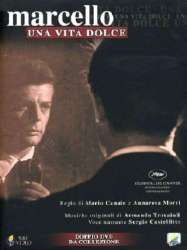
Marcello, una vita dolce (2006)
, 1h38Genres Documentary
Actors Marcello Mastroianni, Claudia Cardinale, Anouk Aimée, Sergio Castellitto, Ursula Andress, Lina Wertmüller
Roles Self
Rating68%





Une vie vécue avec douceur, ce doux regard et ce sourire narquois, cette légendaire paresse. Aujourd’hui encore, dire Mastroianni ou Marcello évoque une époque : un monde fait de bravoure, de beauté, de charme, de gentillesse. Au travers d’interviews de ses proches et de ses collaborateurs, d’extraits de films et d’images d’archives, ce documentaire narré par Sergio Castellitto veut raconter un homme qui a été le plus grand acteur italien et a vécu de façon extraordinaire avec le succès, en pensant souvent qu’il n’était peut-être qu’en train de rêver.

Under the Tuscan Sun (2003)
, 1h53Directed by Audrey Wells
Origin USA
Genres Drama, Comedy, Comedy-drama, Romantic comedy, Romance
Actors Diane Lane, Sandra Oh, Raoul Bova, Lindsay Duncan, Vincent Riotta, Mario Monicelli
Roles Old Man with Flowers
Rating67%





Frances Mayes (Diane Lane) is a San Francisco writer whose seemingly perfect life takes an unexpected turn when she learns that her husband has been cheating on her. The divorce—and the loss of her house to her ex-husband and his much-younger, pregnant new partner—leaves her depressed and unable to write. Her best friend Patti (Sandra Oh), a lesbian who is expecting a child, is beginning to think Frances might never recover. She urges Frances to take an Italian vacation to Tuscany using the ticket she purchased before she became pregnant. At first Frances refuses, but after another depressing day in her gloomy apartment, she decides that it's a good idea to get away for a while.

The Cyclone (1996)
Directed by Leonardo Pieraccioni
Genres Drama, Comedy, Romance
Actors Leonardo Pieraccioni, Perez Nancy Lorena Forteza, Barbara Enrichi, Massimo Ceccherini, Alessandro Haber, Tosca D'Aquino
Roles Gino (voice)
Rating68%






The Cyclone (1996)
, 1h31Directed by Leonardo Pieraccioni
Origin Italie
Genres Drama, Comedy, Romance
Actors Leonardo Pieraccioni, Massimo Ceccherini, Perez Nancy Lorena Forteza, Alessandro Haber, Barbara Enrichi, Natalia Estrada
Roles Gino (voice)
Rating68%





Early summer 1996. Levante Quarini (Leonardo Pieraccioni) is a young accountant of Tuscany who lives his unhappy relationship with women. He lives with his father Osvaldo (Sergio Forconi), his brother Libero (Massimo Ceccherini) and his lesbian sister Selvaggia (Barbara Enrichi) on a lonely residence surrounded by corn fields.

The True Life of Antonio H. (1994)
Directed by Enzo Monteleone
Genres Drama, Comedy
Actors Alessandro Haber, Bernardo Bertolucci, Giuliana De Sio, Ennio Fantastichini, Massimo Ghini, Nanni Loy
Roles Self
Rating65%






I'm Photogenic (1980)
, 1h57Directed by Dino Risi
Origin Italie
Genres Comedy
Themes Films about films, Films about television
Actors Renato Pozzetto, Edwige Fenech, Aldo Maccione, Julien Guiomar, Michel Galabru, Attilio Dottesio
Roles Mario Monicelli (uncredited)
Rating61%





Un modeste figurant fasciné par le cinéma et la célébrité est exploité par un imprésario indélicat
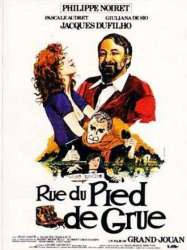
Rue du Pied de Grue (1979)
Directed by Jean-Jacques Grand-Jouan
Origin Belgique
Genres Drama, Comedy, Comedy-drama
Actors Philippe Noiret, Pascale Audret, Jacques Chailleux, Jacques Dufilho, Jean Dasté, Hubert Deschamps
Roles Touchatout
À l'âge de 27 ans, Albert, dit Mozart, se voit contraint par un père alcoolique de prendre des cours de solfège.
Director

The Roses of the Desert (2006)
, 1h42Directed by Mario Monicelli
Origin Italie
Genres War, Comedy, Comedy-drama
Actors Michele Placido, Alessandro Haber, Giorgio Pasotti, Moran Atias, Fulvio Falzarano, Claudio Bigagli
Rating64%





In World War II a group of Italian soldiers is sent to Egypt to provide assistance to the local population. The military, however, should expect other directives from the Duce Benito Mussolini but completely lose contact with the Italy. So the members of the brigade, including some very curious and picturesque as the Captain who loves poetry to stay closer to his wife away, you ambientano with the local customs and forget their duty as soldiers. Soon, however, the war draws everyone and soldiers, along with a brother missionary-talking very loose (Michele Placido) walks through the desert with a troop of Germans. Soon they begin hostilities and the soldiers take up arms, but something has changed and they begin to think that war is a useless thing when we could live in oblivion in a land so beautiful and rich in culture. However, the Warriors do not have much time to think because their Captain, the only hold reference became mad because he discovered that his wife died recently betrayed him, he met his death by jumping stupidly against weapons of some Bedouin.
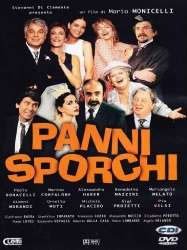
Dirty Linen (1999)
, 1h50Directed by Mario Monicelli
Origin Italie
Genres Comedy
Themes Films about families
Actors Paolo Bonacelli, Marina Confalone, Alessandro Haber, Mariangela Melato, Ornella Muti, Michele Placido
Rating56%





A family in Le Marche: the old father has a business of candy that provides support to the family. However, the man is about to leave the control of the company to his sons, who come with their families in the villa of him. The sons hate each other, and they fight for the possession of money, so when the old family man makes his choice, one of the guys places a bomb in the villa, making it explode.
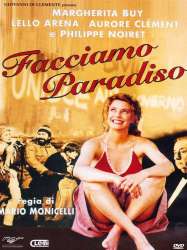
Looking for Paradise (1995)
, 1h48Directed by Mario Monicelli
Genres Comedy
Actors Margherita Buy, Lello Arena, Philippe Noiret, Aurore Clément, Mattia Sbragia
Rating56%





The film tells the story of Claudia Bertelli, a young Italian girl born after World War II, who takes place contestating in '68, along with the Communists, and then mother full of contradictions and doubts over the years of modernism. She dies in 2011, in an era full of crisis.
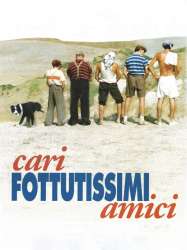
Dear Goddamned Friends (1994)
, 1h58Directed by Mario Monicelli
Genres Drama, Comedy
Themes Sports films, Transport films, Martial arts films, Boxing films, Road movies
Actors Paolo Villaggio, Massimo Ceccherini, Antonella Ponziani, Beatrice Macola, Stefano Davanzati, Paolo Hendel
Rating65%





In 1944 in Tuscany, a group of boxers facing the disasters of the Second World War, during the intrusive presence of the Germans and the Americans, organizes rigged matches to make some money and travel from town to town, hoping to participate in local fairs. A young black American soldier, believed missing, and a girl who refused to marry accompany the ramshackle group.
 , 1h45
, 1h45Directed by Mario Monicelli
Origin Italie
Genres Drama, Comedy
Themes Films about families
Actors Marina Confalone, Alessandro Haber, Cinzia Leone, Paolo Panelli, Monica Scattini, Ramona Badescu
Rating72%





An old couple invite all their children and grandchildren to their home in Sulmona, in Abruzzi, to celebrate the Christmas holidays. After a day spent at church and playing bingo at home, the grandmother asks her two daughters and two sons to decide amongst themselves which of them will take her and her husband to live with them, now that they are getting old. Their children are initially pleased to hear that their parents want to see more of them, but no one wants to take on the responsibility of having them move into their home...

Rossini! Rossini! (1991)
, 2h35Directed by Mario Monicelli
Origin Italie
Genres Drama, Biography, Musical
Themes Films about music and musicians, Films about classical music and musicians, Musical films
Actors Sergio Castellitto, Philippe Noiret, Giorgio Gaber, Jacqueline Bisset, Assumpta Serna, Sabine Azéma
Rating58%





In 1868 the Italian composer Gioachino Rossini is already famous all over the country. However, his last opera The Barber of Seville is not understood and even booed by the audience at La Scala for the indecency of the sets and love situations. Also disappointed by the replicas at the Teatro San Carlo in Naples, then Rossini decides to move to Paris, where he is hailed as a genius.

Dark Illness (1990)
, 1h53Directed by Mario Monicelli
Genres Drama, Comedy
Actors Giancarlo Giannini, Emmanuelle Seigner, Stefania Sandrelli, Vittorio Caprioli, Antonello Fassari, Elisa Mainardi
Rating63%





Calabria. Giuseppe Marchi is an Italian screenwriter who aspires to become a great novelist. However, he has deep psychological problems...

I picari (1987)
, 2h1Directed by Mario Monicelli
Origin Italie
Genres Comedy, Comedy-drama, Action, Adventure
Actors Giancarlo Giannini, Enrico Montesano, Vittorio Gassman, Nino Manfredi, Giuliana De Sio, Bernard Blier
Rating63%





The film is directed by Monicelli the last to be set in renaissance and medieval eras such as L'armata Brancaleone. The genus, as in other previous film, is constituted by a tilting of society and the environment of the ways to make the characters in which takes place the film, making the genus parodistic and goliardic.
 Connection
Connection



